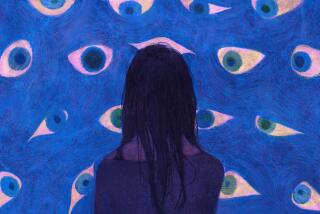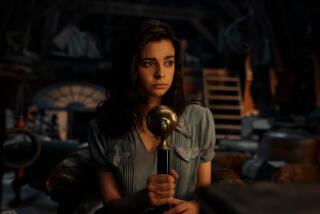4 Legs, 2 Good Eyes : Blind Escondido Tandem Bicyclist to Race Again in Tour de France
Nevin Musgrave figures that when it comes to tandem bicycle racing, he’s got about the best possible partner to peddle from the back seat: A blind man.
And Ray Patterson--the blind man--thinks he’s finally found a sport in which he can participate with absolutely no handicap. After all, when hunched over so your nose is just about touching your partner’s tail bone, what’s there to see?
Musgrave and Patterson--four good legs and two good eyes between them--think they’re pretty hot stuff, so they’ve headed off to Paris, where they’ll be competing in July in the tandem bicycling component of the Tour de France, the world’s premier bicycle-racing event, actually several races strung together over the course of about three weeks.
Patterson initially took to tandem bicycling for more domestic reasons: It’s the one sport, he notes, where the husband can’t leave his wife in the dust, or vice versa. So Patterson and his wife of five years, Bobbi, bicycle for hours in the hills and down the rural lanes around their home in southwest Escondido.
Patterson said he was always drawn to bicycling but couldn’t very well pursue it until he found a partner who enjoyed the sport and could sit up front.
Patterson, 39, lost his right eye to retino blastoma, an eye cancer, when he was 3 years old, and his left eye developed a blinding cataract from the childhood radiation treatment. Today, he has little or no recollection of sights or colors, and he grew up resolved not to let his blindness be a handicap.
He attended a school for the blind, then earned a bachelor of art’s degree in history from Kansas State University. He got a job as a student counselor at the University of Nevada at Las Vegas.
All the while, Patterson, scrawny and lean with a wild brown mop, nurtured his love for sports.
Archery, for instance. He used the tick-tick-tick of an alarm clock as his target.
He tried snow skiing, but following bad instructions from a sighted partner he zigged when he should have zagged and ended up against a snow fence, upside down in five feet of powder.
He attends as many grand prix automotive races as he can, including ones in LeMans and Monaco, positioning himself along a straightaway to pick up the sounds of speed or cozying his way into the pits to hear--and smell--the sport.
Once, Patterson even bought an airplane--not that he planned to fly it. A friend did. But he said he enjoyed the sense of motion that can only be experienced in a small airplane.
And, in 1972, Patterson qualified for the Olympic trials in wrestling; he was was a varsity wrestler at Kansas State.
Patterson’s zest for life hasn’t been limited to sports. First alone, and then more recently with his wife, he has traveled around the world several times, for business as well as pleasure.
He can’t discuss the sights but he can go on for hours about the other sensations he experienced in such places as Singapore, India, Nepal and Ireland, often challenging fellow travelers on their observations because he could detect nuances in speech, smells and feelings that his sighted friends overlooked.
At one point he set up a wholesale business to import swap-meet items to the United States.
It was after he married Bobbi that the couple went to France, where they found an inexpensive apartment to rent in downtown Paris and where he hooked up with a tandem bicycle club for the benefit of blind bicyclists.
No similar equivalent exists in the United States, he said.
He remembers his first ride was cold and miserable and being told later that his sighted pilot had taken the bike up to speeds of 35 m.p.h. down a narrow bike lane where the clearance between handle bars and the safety poles to keep out motorists was only two or three inches.
Ignorance was bliss, Patterson said.
The couple lived in Paris for two years, then came upon a travelers’ bargain to travel by train from Budapest to Peking, via Moscow, for $54 per person.
They took their tandem along and were crestfallen to learn that a baggage car snafu in Moscow kept their bike there, while they ended up in China. Undaunted, the couple spent five months in Southeast Asia and Singapore before returning to Peking, by which time the tandem bike had been delivered.
Several months ago, the couple returned home to Escondido, and Patterson kept in shape with his wife and other bicyclists so he could enter his third Tour de France.
In his first race, in 1985, Patterson and his partner placed 24th in a field of 94 bicycling pairs--each with a sighted captain and a blind power stroker, or “stoker,” in the back.
In 1986, he placed 35th in a field of 56 tandem teams; he blames the less-than-fulfilling finish on his captain, who had not ridden tandem before and was unfamiliar with the techniques of riding a bicycle built for two.
So he and Musgrave, 34, who lived in Vista until moving recently to Wofford Heights, near Kernville, have high hopes for this year’s race since both are experienced tandem riders.
“This is a sport where there doesn’t have to be any concessions for the handicapped,” Patterson said. “There is no negative effect, no disparity. My job’s simply to add power and balance to the machine.”
Musgrave said he couldn’t hope for a better partner than Patterson, blind or not. “The guy in back has to totally trust the person in front, to learn balance and to judge what the person in front is going to do. They’re like dance partners,” Musgrave said. “And it doesn’t matter if the guy in the back can see or not, because there’s nothing to see anyway when you’re back there.”
More to Read
Go beyond the scoreboard
Get the latest on L.A.'s teams in the daily Sports Report newsletter.
You may occasionally receive promotional content from the Los Angeles Times.










